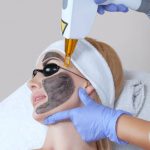A few ingredients have taken the world of the world of skincare quite as much as CBD. If you take a closer look, there’s plenty of it, such as in sunscreens, masks, lipsticks, lip balms, and a lot other products. The question is: should you really be putting the stuff over your body?
The first step is to discuss the definition of what CBD is. CBD (CBD) can be described as an active component found in CBD, which is a key ingredient in hemp plants, according to Harvard Health Publishing. CBD can be extracted from marijuana, either medicinal cannabis as well as hemp. While marijuana is a source of CBD, it doesn’t possess psychoactive effects. (THC, tetrahydrocannabinol, is the chemical that causes the high.) However, CBD won’t lead to any mental-altering effects.
The Proposed Benefits of Skin-Care Products With CBD
Experts attribute the acclaim of CBD due to its “do anything” reputation. Many people are turning to CBD to try alleviating various ailments, such as anxiousness, insomnia, and pain; as well as in recent times, it seems that skin issues are a major concern.
In general, companies include CBD in their items to offer them a boost. “CBD is a very cost-effective way to enhance products,” states Austin Katz, cofounder of Sheabrand in Brooklyn, New York. CBD is used in a variety of products -those which claim to help with the appearance of acne, dry skin, and eczema due to its broad range of applications. “I think we’re living in an era where people want to feel empowered to address their needs on their own,” the doctor says.
CBD Skincare
Research on the scientific basis for the benefits of CBD in products for skin care isn’t extensive. If you’re considering trying this method, Here’s what a board-certified dermatologist has to say about it.
Potentially Helps Inflammation, Eczema, and Psoriasis
One of the most talked about benefits of CBD is reducing inflammation. “The body has two CBD receptors that we know of CB1 and CB2,” claims Robert Dellavalle, MD Ph.D., who is an adjunct professor of medical epidemiology at the Colorado School of Public Health in Aurora. When it is applied to the skin CBD acts on these receptors in order to reduce the inflammation response. It does this through “decreasing those interleukins,” which are chemical compounds that function as the immune system’s alarm that alerts the fire department in an emergency. CBD can reduce the sound of that warning,” he explains.
In the end, you could notice less redness overall as well as in skin disorders such as the eczema as well as psoriasis and eczema, CBD creams may help in reducing itching, perhaps because CBD creams can help decrease dryness, according to the review that was published during July of 2017 in the Journal of the American Academy of Dermatology. (Dr. Dellavalle was a co-author of that study.) Be aware. However, the review contained only three studies, two studies in humans, but with tiny sample sizes and one on mice. This isn’t always a good indicator of the health of humans. Therefore, more research regarding the possible advantages of CBD in reducing skin redness is required.
Furthermore, a smaller study that was published in the March-April 2019 issue of the Italian journal Clinical Therapeutics focused on 20 patients suffering from eczema, psoriasis, or eczema scarring. The study discovered that a CBD-specific Ointment helped improve the hydration of the skin (by moisturizing and stopping loss of water) and also increased the elasticity of the skin, and improved their quality of life. It could be because of the fats present in the ointment. However, it is probably also because of the anti-inflammatory effects of CBD, as the study authors claim. Further research on more people is required to determine for certain.
For a variety of skin conditions, dermatologists typically prescribe topical steroid creams that are anti-inflammatory drugs. “These are suitable for the majority of people and are effective, but some people aren’t keen to take the steroids any manner. CBD may be an alternative nonsteroidal treatment to fill the space,” says Dellavalle. The adverse effects of topical steroids can include thinning of the skin when prolonged use or overuse; however, you can reduce the risk of these issues by you use them in a safe manner, according to the National Eczema Association. In collaboration with your dermatologist, ensuring you are taking the correct medication in the right dose can help in this regard.
In fact, Mona Gohara, MD, is a dermatologist from Hamden, Connecticut, and the associate clinical dermatology professor of Yale University in New Haven, Connecticut, prefers to utilize CBD “in inflammatory skin conditions as they’re fizzling out.” She also says, “I recommend generally using a medication to put out the fire and then using CBD to clean up the carnage.”
Beyond that, however, is the possibility of using CBD as a way to slow the signs of aging. “Inflammation is the basis of all skin disease, including aging,” she explains. There are plenty of rumors about CBD in skincare -as well as health overall, there’s no solution that is 100% effective. “Everything has its advantages and disadvantages or limitations,” the doctor said. Gohara.
Possibly Plays a Role in Treating Acne
As a treatment for skin inflammation, CBD is also featured in a few anti-acne treatments. For example, Mantra Mask’s CBD Blemish Mask contains CBD as well as tea tree oil to fight pimples. “There is CB2 receptors on the sebaceous glands that produce oil. According to studies, CBD influences the sebum production of cells and also has an anti-inflammatory element,” claims Jeanette Jacknin, MD, who is a board-certified dermatologist from Solana Beach, California, who is a specialist in CBD skin treatment. This is in line with findings from previous articles written in The Journal of Clinical Investigation and Experimental Dermatology.
Dr. Jacknin also points to preliminary research she presented in June 2019 at the annual conference of the American Society for Microbiology, which found that topical CBD could assist in killing a variety of Gram-positive bacteria. “This bacteria is one cause of acne,” she declares. (For the research, the researchers worked in collaboration with Botanix Pharmaceuticals, a company which creates products for treating skin disorders such as acne and psoriasis.)
May Decrease Inflammation From Sunburns
Another of the latest applications for CBD for skin treatment is sunscreen. Dellavalle states that it may make sense to include CBD in sunscreens since its anti-inflammatory properties can aid in reducing the effects of sunburn, such as irritation and redness. It is true that the goal of applying sunscreen in a correct manner (following guidelines from the American Academy of Dermatology); however, in real reality, many people miss the areas that are not covered, so applying a CBD-infused sunscreen could provide greater absorption and help reduce the reaction of sunburned areas according to him.
What Scientific Evidence Doesn’t Yet Tell Us About CBD for Skin Care
If CBD is a possible solution to your skin problems, It’s a good idea to look back at the larger picture. “What we do not possess in CBD is an abundance of research. CBD has been a crime in the federal government for a long time and it’s been hard to conduct research on something that was previously considered equal to heroin or cocaine,” says Dellavalle. It’s beginning to change, however. The 2019 Farm Bill removed hemp from marijuana’s definition, which means that CBD products could no longer be thought of as marijuana. This has opened the way for research scientists can conduct further studies into CBD and also for producers to produce and sell CBD products legally. However, according to the Food and Drug Administration (FDA), it is still illegal to sell CBD as an ingredient in a supplement.




